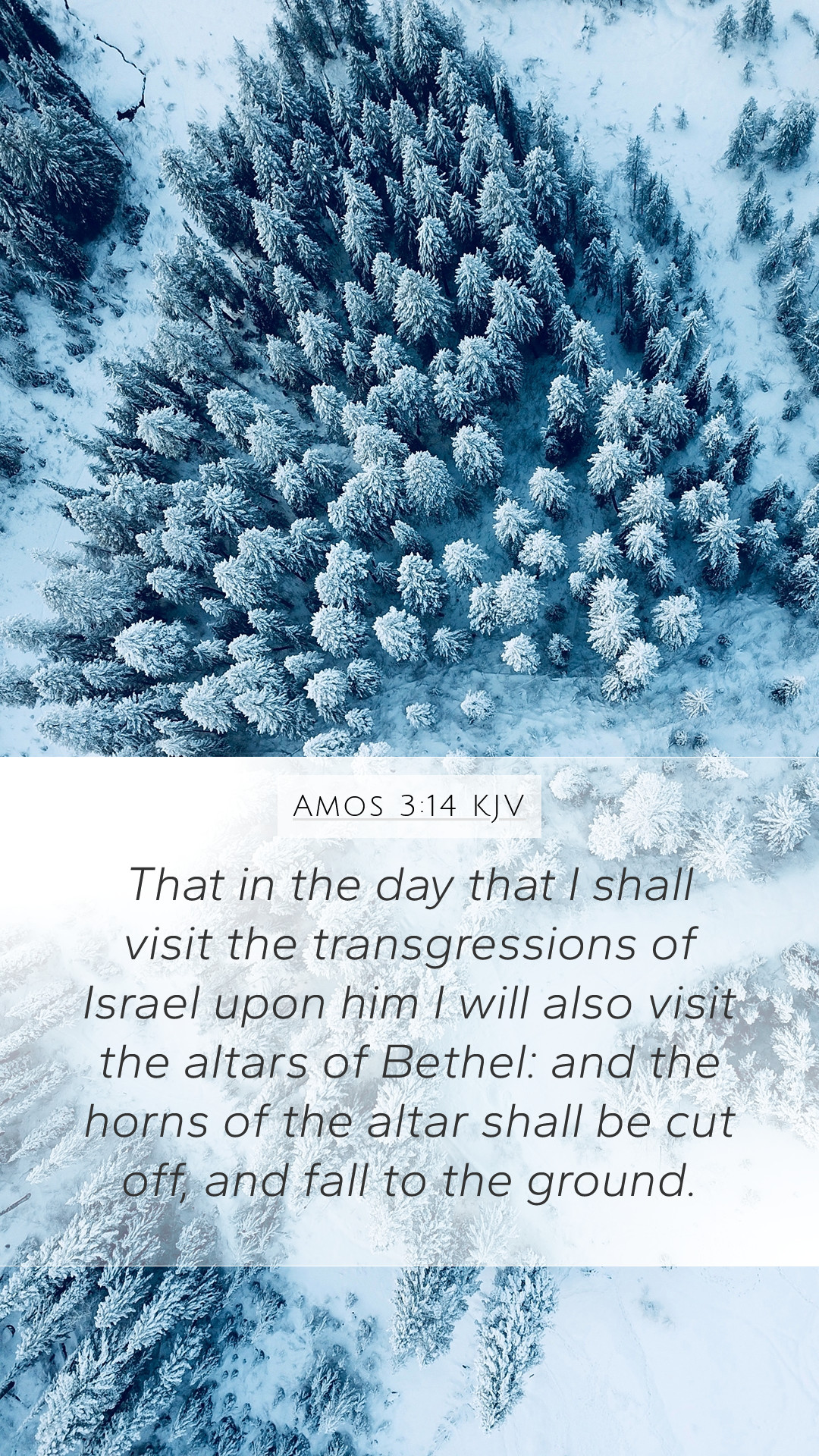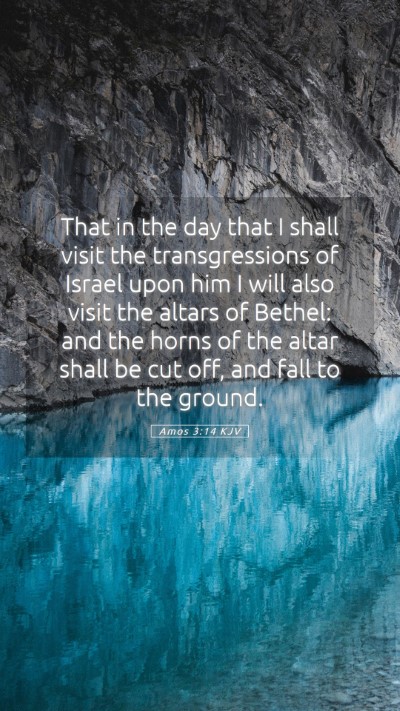Old Testament
Genesis Exodus Leviticus Numbers Deuteronomy Joshua Judges Ruth 1 Samuel 2 Samuel 1 Kings 2 Kings 1 Chronicles 2 Chronicles Ezra Nehemiah Esther Job Psalms Proverbs Ecclesiastes Song of Solomon Isaiah Jeremiah Lamentations Ezekiel Daniel Hosea Joel Amos Obadiah Jonah Micah Nahum Habakkuk Zephaniah Haggai Zechariah MalachiAmos 3:14 Meaning
What is the meaning of Amos 3:14?
That in the day that I shall visit the transgressions of Israel upon him I will also visit the altars of Bethel: and the horns of the altar shall be cut off, and fall to the ground.
Amos 3:14 Bible Verse Meaning
Understanding Amos 3:14: A Comprehensive Commentary
Amos 3:14 states: "That in the day that I shall visit the transgressions of Israel upon him, I will also visit the altars of Bethel: and the horns of the altar shall be cut off, and fall to the ground." This verse carries significant weight within the context of the prophet Amos's message to Israel, particularly in understanding divine judgment and the religious practices of the Israelites.
Bible Verse Meanings and Interpretations
This section provides an overview of the verse's meaning, derived from the insights of Matthew Henry, Adam Clarke, and Albert Barnes.
Historical Context
The background of Amos's prophecy is essential for understanding this verse. Amos was one of the minor prophets who preached during a time of relative prosperity in Israel, but moral decline was rampant. The worship at the altars of Bethel represents a deviation from true worship, indicating the people's idolatry and sin.
- Idolatry at Bethel: The altars mentioned in the verse are linked to the golden calves set up by Jeroboam, which became a significant symbol of Israel's rebellion against God.
- Divine Judgment: Amos emphasizes that God will not overlook the sins of His people. The phrase "I will also visit the altars" indicates God’s intention to hold His people accountable for their transgressions.
- Consequences: The "horns of the altar" represent strength and refuge, and their destruction symbolizes the removal of what the people falsely relied upon for protection from divine wrath.
Insights from Commentaries
-
Matthew Henry:
Henry elucidates that the visitations from God will not only be upon the people themselves but also upon their false worship practices. The ruin of the altars signifies a broader judgment upon Israel's spiritual corruption.
-
Albert Barnes:
Barnes notes that this verse underscores God's sovereignty and His just response to the idolatry within Israel. He emphasizes the need for sincere worship and warns about the futility of relying on corrupt religious practices.
-
Adam Clarke:
Clarke provides a mystical interpretation, suggesting that the cutting off of the altar’s horns signals the end of insincere worship and a call for true repentance from the Israelites.
Application of the Verse
In today's context, Amos 3:14 can be challenging but relevant, particularly in personal and communal worship practices. The verse serves as a reminder that God desires fidelity in worship and honest hearts before Him.
Modern-Day Lessons
- Authenticity in Worship: Just as the Israelites relied on false altars, individuals today may mistakenly depend on rituals without a genuine relationship with God.
- Accountability: This passage calls believers to consider how they engage in worship and underscore the importance of turning away from anything that distracts from a sincere commitment to God.
- Judgment and Mercy: It is essential to recognize that while God's judgment is real, His call to repentance is an offer of mercy.
Additional References
Amos 3:14 aligns with several biblical passages that expand on its themes of judgment and worship:
- Hosea 8:14: Discusses Israel's neglect of God while engaging in idolatrous practices.
- Isaiah 1:11-13: Criticizes the people for their empty rituals that do not please God.
- Jeremiah 7:30-34: Indicates God's displeasure with Israel's worship practices that defy His commandments.
Bible Study Insights
This verse should encourage further examination within Bible study groups and provide insights for online Bible study sessions. It opens discussions on Bible study topics such as:
- The importance of examining one’s heart in worship.
- The historical context of Aaron's golden calf and its implications.
- How to apply the lessons of Amos to modern-day faith practices.
For those seeking deeper understanding, this exploration into Amos 3:14 facilitates in-depth Bible verse analysis and provides valuable Bible study resources for personal growth and community learning.


